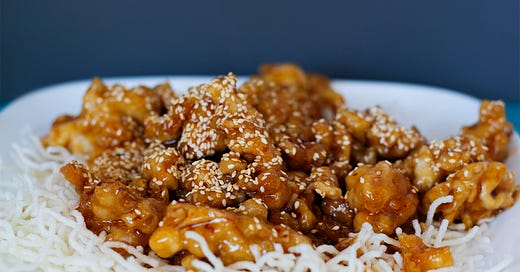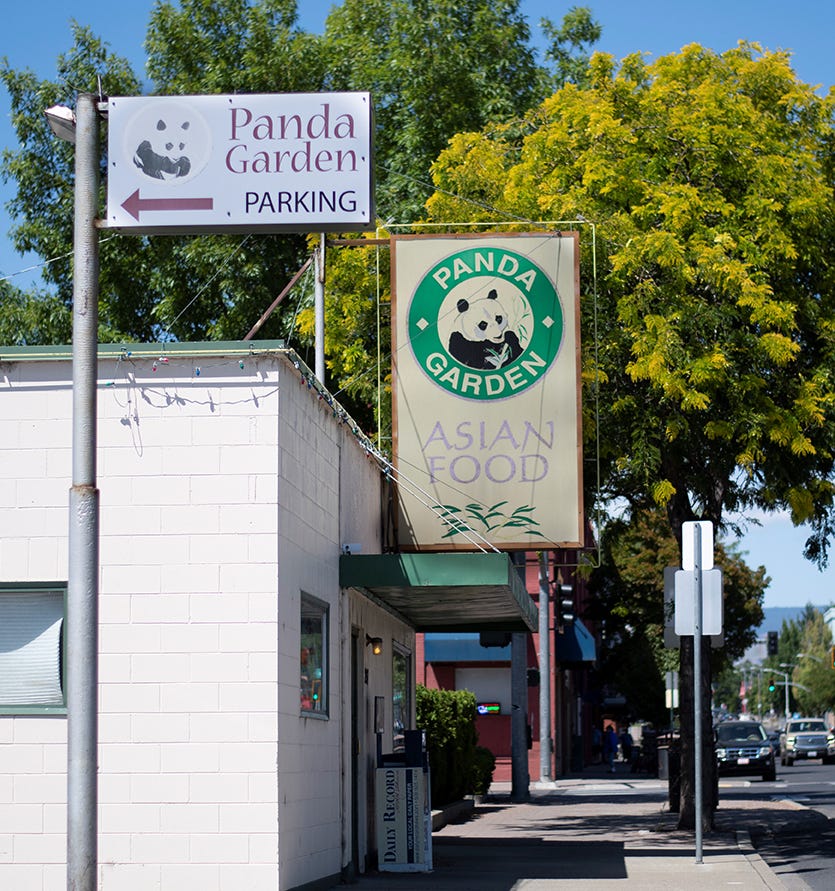On the beloved restaurant closing paradox
Slide into the booth and let's talk about desperate economic insecurity over a nice big plate of steamed white rice and boiled chicken
My new poetry collection These Empires, These Flowers is coming out in April 2025! If you like my writing here, you might enjoy my poems. Reply to this email or message me to pre-order.
Before I was diagnosed with celiac at 10, I had funny-ass dining habits. To be fair, 29 years and 364 days later, I still have funny-ass dining habits. But one of the things I ate toward in those sweet childhood days of constant gastric pain was flattened, tasteless homogeneity. Some part must’ve been average picky kid eating stuff, for sure. Another part was gravitating toward inoffensive foods that would, for sure, not add to my decade of digestive terror.
Maybe my favorite restaurant on Ellensburg, Washington’s wimpy strip of a downtown was Panda Garden. A tiny plop of a building with a white facade and green trim that somehow matched the food and vibe of the restaurant like the temperature of a well-drawn bath. A sort of uncomfortable-looking drawn panda logo looked at you below a neon red open sign like a baseball mascot. Detailed Chinese zodiacs on the menu. Deep jade booths, glass tables, a loud kitchen sputtering pots and pans at every hour of the day and night. This fucking place.
I always ordered steamed white rice and unseasoned chicken. No sauce. The restaurant opened one year after I was born; the Consumer Price Index (CPI) puts the $14 Panda Garden charges for an entree now at just over $7 in 1998, about when my mom would’ve moved us back to Ellensburg from Bainbridge Island. A plate of that went far for a single mom who hated cooking. We ate here all the time; dinners ended with fortune cookies, naturally, but I always looked forward to the rice candy. Little blue rabbits leaping over some invisible hurdle on a piece of paper the size of my little boy palm.
Imagine my dropped jaw, my genuine disbelief, when I drove into town and saw Panda Garden dead on arrival. In its place on Main Street stands new challenger Taste of India. After almost 30 years, Panda Garden is sleeping with the fishes, with my memories.
What I’ve just described is a common experience in the United States. A place no one believes could ever depart the community, hometown in my case, whether it’s the lunch place, the date spot you and your significant other make it to once every six months, shutters. Working in food media, it’s a playbook I see all the time: in the best case for longtime diners, business ownership blast the curtain call on a Meta platform, a cacophony of shock rings through the Internet, people turn out in fantastic droves before that final service, the universe finishes exhaling before its next breath.
There are a few deviations to this that are so game-breaking they are worth examining. They’ll also help us understand why Panda Garden’s closing represents a major issue befalling both business owner and diner alike throughout this great, united, untroubled nation. Like the name the United States, they are paradoxes.
Here’s the first one. (Be a sport and remember Panda Garden is a stand-in for a number of restaurants in this essay, alright?) Panda Garden ownership get notice their legacy lease is increasing two-fold next year. They can’t afford to stay open. They let diners know the time has come. So many people show up that, remarkably, Panda Garden makes 300 percent year-over-year this March. The lease renewal isn’t until June.
Now Panda Garden is thinking people still love the restaurant so much and are going to support, so maybe they can stay open after all. The paradox shows up when, hearing the restaurant won’t close after all, that fervor dries up. A sudden drought. The restaurant is lucky if a new revenue or investment scheme arrives. This version happened in February 2025 with Berkeley’s Homemade Cafe.
Here’s another puzzler. Panda Garden ownership can’t get customers to come back in after a pandemic office-bottoming out of you-name-it-downtown. They can’t afford to stay open. They decide it would be better to meet their fans where they’re at: delivery-only. Panda Garden closes its restaurant space, pivoting to a ghost kitchen model. Fans are devastated; comments indicate the end times are near.
It’s as though the beloved restaurant must fit the community in multiple ways, as though a place to eat should be, well, a place. The paradox shows up when diners would like Panda Garden to exist in their memory and, once or twice a year, in real life. This version happened (in one Take on the situation) with Oakland’s Lion Dance Cafe.
There are loads of paradox-y panels on this cerebral jalopie, but here’s the last for our purposes. The Central Washington talent behind Panda Garden are losing too much money per longtime favorite dish. They can’t afford to stay open. They want to swap from an a la carte menu to a tasting menu to better control cost of goods. They let fans know the restaurant will close to flip into this new model. A clambor drums through their social media pages — anticipation is high. After a sunk cost, Panda Garden reopens as a new concept.
The first month is phenomenal, exceeds expectations. Then the restaurant is a ghost town. Just six months later, the restaurant tells fans that, this time, Panda Garden will close for good. The paradox shows up when restaurant owners ask themselves why diners refuse to eat at their little neighborhood spot no matter what they seem to do. This carousel version happened with the East Bay’s Delirama and its various spin-offs.
Here’s the most head-scratching part in my dusty rural mind. In all the scenarios, it’s because the restaurant can’t afford to stay open. Inflation is crippling, grocery prices are going up thanks to the new administration, and, probably most relevantly, income inequality between renter and building owner has never been more tragic. Elazar Sontag wrote about this for Bon Appetit: even the developer-backed places with millions of dollars can barely afford to stay open.
The big problem is the violent gouging of middle- and working-class people.
There are a few strands to weave, something something thoughtless consumer behaviors and responsibility to support small businesses in concert with something something wealth redsitribution and governmental mandate. (Remember how in the pandemic we learned that even the U.S. can support socialist programs?) Panda Garden, and all the other imperfect, dearly beloved restaurants in our landscapes, can’t make it on their own.
It will be important for the paradoxical country, the inward-gazing self-congratulating era, to decide if local restaurants belong anywhere other than the photo albums left at our parent’s houses, dust hypnotizing the yellowed pages.







i’d like to think we all have our own Panda Garden…mine is Dessert Republic, a beautiful cheesily-painted late-night HK-style dessert cafe in San Mateo. many a bowl of sesame soup was enjoyed there at 11pm…